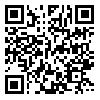Najafabad Branch, Islamic Azad University
Abstract: (148 Views)
Introduction and Objective: Due to being away from or being neglected by their families, child laborers spend their childhoods far from happiness and peace. This situation affects their sensitive childhood and adulthood years and leads to emotional and behavioral problems such as aggression and anxiety. This study was conducted to determine the effect of life skills training on emotional behavioral problems and hope for the future of Afghan migrant child laborers.
Method: This is a semi-experimental study. The research population was the Afghan migrant child laborers of Isfahan in 2023. 50 people were selected conveniently and were replaced into two intervention and control groups randomly. The intervention group received 10 sessions of life skills training. The control group didn't receive any intervention. Participants answered the Kazdin Children's Hopelessness and Goodman Strengths and Weaknesses Questionnaires before and after the study. Data were analyzed using descriptive (frequency, mean, and percentage) and inferential (independent and paired t-tests) tests in SPSS18 software.
Result: The mean scores of emotional-behavioral problems and hope for the future were not significant in the two groups before the study (p<0.05). After the intervention, the mean scores of emotional-behavioral problems were 46.31 ± 0.49, with a significant decrease in all its components except the hyperactivity component (p=0.001). However, the mean score of hope for the future was 16.03 ± 6.18, which was not significant. In the control group, the mean scores of the variables did not change and were not significant (p<0.05).
Conclusion: Life skills training improves the emotional behavioral problems of Afghan migrant child laborers, but a longer process may be needed to impact their hope for the future.
Method: This is a semi-experimental study. The research population was the Afghan migrant child laborers of Isfahan in 2023. 50 people were selected conveniently and were replaced into two intervention and control groups randomly. The intervention group received 10 sessions of life skills training. The control group didn't receive any intervention. Participants answered the Kazdin Children's Hopelessness and Goodman Strengths and Weaknesses Questionnaires before and after the study. Data were analyzed using descriptive (frequency, mean, and percentage) and inferential (independent and paired t-tests) tests in SPSS18 software.
Result: The mean scores of emotional-behavioral problems and hope for the future were not significant in the two groups before the study (p<0.05). After the intervention, the mean scores of emotional-behavioral problems were 46.31 ± 0.49, with a significant decrease in all its components except the hyperactivity component (p=0.001). However, the mean score of hope for the future was 16.03 ± 6.18, which was not significant. In the control group, the mean scores of the variables did not change and were not significant (p<0.05).
Conclusion: Life skills training improves the emotional behavioral problems of Afghan migrant child laborers, but a longer process may be needed to impact their hope for the future.
Type of Study: Research(Original) |
Subject:
Health Education and Promotion
Send email to the article author
| Rights and permissions | |
 |
This work is licensed under a Creative Commons Attribution-NonCommercial 4.0 International License. |


